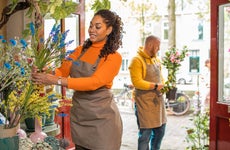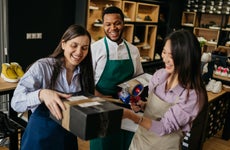Budding opportunities for Buddy’s Wine: Serving up unique wine and community engagement

The Bankrate promise
At Bankrate we strive to help you make smarter financial decisions. While we adhere to strict , this post may contain references to products from our partners. Here's an explanation for .
During and immediately after the pandemic, smaller cities grew as people moved away from major metropolises. In some cases, that growth meant former big-city dwellers brought their passion and expertise to businesses in their new locales. Buddy’s Wine, in Ventura, California, is a prime example.
Born from owner Alexis Wade’s reorientation during the pandemic, Buddy’s now pours wine and more from its location in an up-and-coming part of the coastal community.
While businesses were scaling back or closing down during the pandemic, Wade was dreaming up a way to fill a hole in the local wine scene. On a rare drizzly day in Ventura, we sat down with her to talk about the relatively new business venture.
What inspired you to open Buddy’s Wine?
I’ve always worked back-of-house in restaurants — in high school, college, and after college. Then I randomly segued into the film world for many years. I always knew I wanted to open up my own space. But then the pandemic hit and I reoriented.
It kind of feels like everything fell into place. I was getting more deeply into wine, knew that space didn’t necessarily exist here in Ventura, and was ready to leave the film industry.
I pulled the trigger on it and now I have a wine bar!
How do you meet the people you source the wine from?
The way I do it — and the way it’s done at most wine bars and restaurants — is that we work with reps who work for bigger importers. Those importing companies store and ship different wines.
But then there are also winemakers who don’t have distribution through importers and they do direct sales. It’s old school. They reach out online, or we reach out. We definitely have some options like this on our shelves — like Horse Feathers, which is from Sonoma but the guy is native to Ventura. His grandfather used to say, “That’s horse feathers!” and that’s how the wine got its name.
Guidant Financial’s 2023 Small Business Trends found that food and restaurant were a top industry for small businesses. 12 percent of all business owners surveyed operated in the food and restaurant industry. It was also a top industry for women-owned businesses, with 14 percent operating within it.
Did you face any challenges in opening initially?
Of course! Honestly, my biggest issue was waiting for permits from the city.
I didn’t budget for how much overhead I was going to need just for waiting. You get a grace period from your landlord — I got seven months. But it took two years to get this place open. It was all of this money that I hadn’t considered in my budgeting that I had to scramble and find.
So, how did you fund Buddy’s in the beginning?
Initially, it was all private: my money, plus money from family and friends that I would pitch to who would invest. I was collectively drawing from any resource I could. Banks typically aren’t lending money to a business like mine.
Eventually, I partnered up with WEV (Women’s Economic Ventures). They’re great and you can get loans from them — they’re very high interest, but you can get the loan.
The 2022 Impact Report from Women’s Economic Ventures found that 77 percent of their clients identified as women and the top industries were retail trade and food and accommodation. In 2022, they served 1,000 participants.
Did you apply for business loans and get denied, or did you already know that this kind of financing is hard to come by for new businesses?
My dad’s an accountant, my sister’s a restaurant owner, and they both told me (it was hard). I applied with Chase Bank, but they denied me.
I had some capital to begin with, though.
I was still working full-time in the film industry. I would come up here between jobs because I was freelance. It was like a year of living at home and using what I would have paid in rent for an apartment for the rent here (at the Buddy’s location).
I worked up until the point that this needed me full-time. Three months before I opened, I took my last film job.
The 2022 Small Business Credit Survey by the Federal Reserve Banks found 69 percent of women-owned businesses used personal savings, and 27 percent used friends and family to fund their businesses.
When seeking funding, 25 percent of women-owned businesses were denied, whereas only 19 percent of men-owned businesses were.
What did you do in the film industry?
I was a prop master — and it really did help (with decor at Buddy’s). And honestly a lot of my friends from the art department helped with the space. Which is another way I was able to afford to do all of this.
I did have a contractor because I had to for the city, but they just did the skeleton. My friends helped a ton with the rest.
What wins are you currently celebrating?
The staff is great. Everybody on the crew is really solid and dependable. It feels like a treasure.
What obstacles are you facing right now?
Flow of traffic. It’s either very busy or very slow. I’m trying to figure out ways to fill those slower days. I do a lot of events and that helps buffer the really slow days and weekends.
Every business in Ventura struggles with that.
As a small business owner with a relatively newly opened business, what’s your biggest takeaway so far?
Community support is paramount. I’m really grateful for the community.
How does Buddy’s engage with the community?
All of the folks who come and do food things here are from the community. Usually, I’ve either been to an event of theirs or saw them on Instagram and approached them that way.
With the art gallery across the street, we recently started doing a dedicated First Friday, too. We have a food thing here and maybe some music, and the art gallery and Poppy’s (the vintage shop next store) stay open late.
In terms of the pop-ups, there are a lot of really incredible people making food around here who don’t necessarily have a space for it. It feels lovely to have a place for them to set up.
According to Global Entrepreneurship Monitor’s 2021/2022 Women’s Entrepreneurship Report, 70.5 percent of women entrepreneurs in the United States were motivated to start a business to make a difference.
Related Articles


Small Business Saturday: Supporting women-owned businesses that give back


What are SBA Community Advantage Small Business Lending Companies?